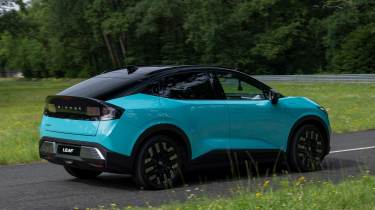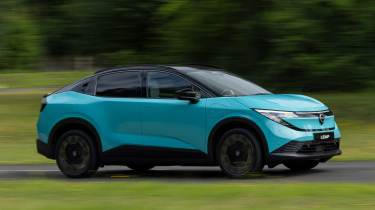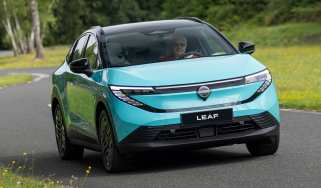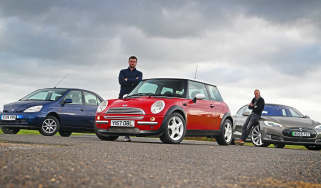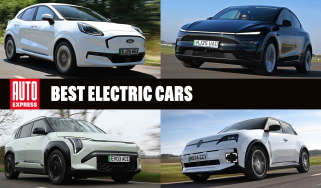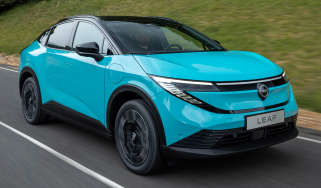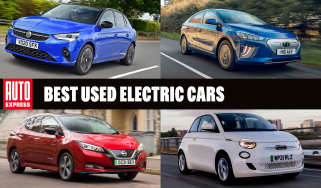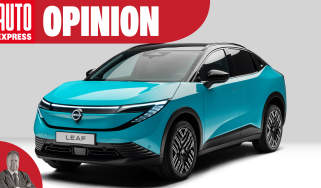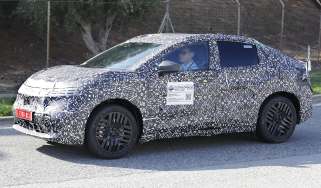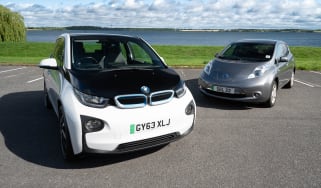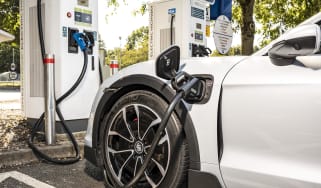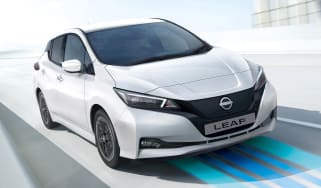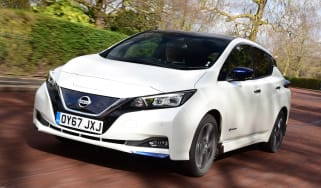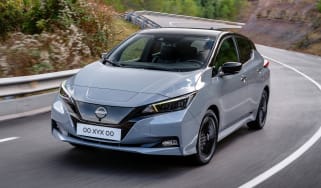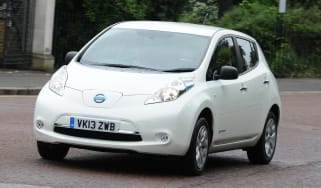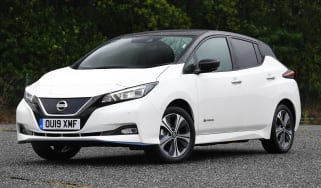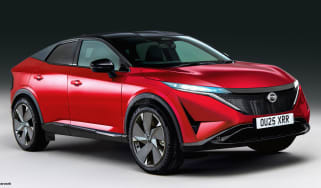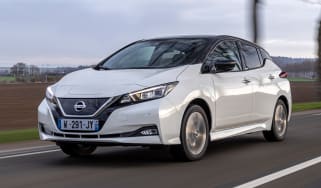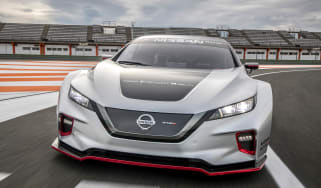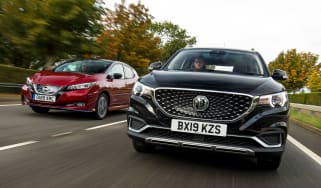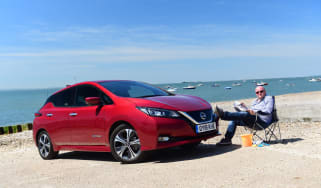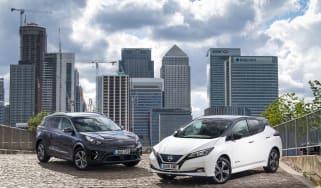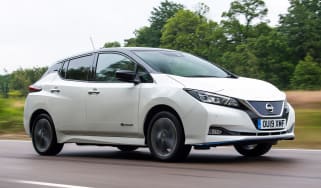Nissan Leaf review
This is a wholesale reimagination of Nissan’s C-segment EV for the better. The new Leaf is very good and built in Britain!

Our opinion on the Nissan Leaf
It’s not without merit to say Nissan’s head start in electric car design and engineering has been swallowed up by its key rivals, both legacy and new-age, but the all-new Nissan Leaf is proof there’s still brilliance to be found within the halls of Nissan. The Leaf is comfortable, refined, technologically advanced and yet still approachable to people who buy cars out of necessity more than passion. If it’s priced right, this could well be one of the big surprises of recent years, which comes as brilliant news considering it’s built right here in Britain.
About the Nissan Leaf
The Nissan Leaf was once a pioneering car in the race towards electrification. The first mass-produced electric car, it offered a relatively low-cost package in the electric C-segment class decades before rivals, and was a glowing testament to the brand’s ambition of bringing EV motoring to the mainstream. However, the speed at which rivals have advanced has made life tricky for the Leaf, so to react Nissan’s given us an all-new generation – and this one isn’t resting on its laurels.
That’s because this third generation Leaf is a totally different proposition from the one that came before. It now rides on a new platform, and rather than taking the shape of a traditional VW Golf-like hatchback, it now features a crossover-like fastback body. It also comes with a far more impressive range figure and a cutting-edge interior.
Nissan Leaf pricing and latest deals
The Nissan Leaf is amongst a growing number of electric cars to meet the criteria required for the full £3,750 discount as part of the Government's Electric Car Grant (ECG), announced in July 2025, thanks to part of its electric powertrain being manufactured in the UK.
Used - available now
Pricing for the Leaf starts at just over £32,000 for the entry-level Engage. Our preferred Engage+ is a little over £33,000, while the Advance trim is around £33,000. The top-of-the-range Evolve comes in at just over £36,000.
While prices have been announced, the first cars aren’t due until the very end of 2025, with customer deliveries starting shortly after. As such, there are no deals available on the Auto Express Buy A Car service, and lease offers are yet to be published.
Performance & driving experience
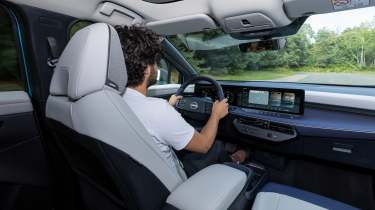
| Pros |
|
| Cons |
|
It’s clear that Nissan did not need to set out to build a high performance or fun-to-drive EV, and on those counts it has certainly succeeded. Yet this makes the Leaf feel much more in tune with its key buying demographic: those looking for a calm, comfortable and confidence-inspiring electric car driving experience.
Outright performance from our 75kWh model is more than enough in day-to-day driving, but more impressive is the throttle calibration and smoothness. There’s nothing jerky or too urgent about the front-mounted e-motor’s acceleration, which will cleanly apply power without a chirp from the tyres, even in Sports mode.
The ride quality is even more impressive, the Leaf makes soft and cosseting progress without feeling too underdamped, or as though it doesn’t have enough suspension travel to deal with big bumps. By comparison, a Volkswagen ID.3 feels a little bouncy, and the Kia EV3 feels more connected to the road, but lacks the polish and bump isolation that the Leaf offers.
Overall refinement is also excellent. There are good levels of sound deadening from road roar and very little wind noise, with the exception of the wing mirror’s tendency to whip up a bit of a racket.
Over really rough Belgian pavé, the body remained free of creaks and rattles, making the whole car feel solid and strong. We only had a small amount of time at motorway speeds, but the Leaf seemed very stable and confidence-inspiring, although hard cornering did see a fair bit of body roll, as you’d expect from a car with such a plush ride.
Electric motors, 0-60mph acceleration and top speed
Nissan quotes a 0-62mph time of 7.6 seconds for the 75kWh model and that feels about right in the real world. With 215bhp and a hefty battery pack, the Leaf wasn’t likely to be a surprise hot-rod, but it gives the model enough performance to never feel like it’s struggling to keep up with traffic. Top speed is limited to 100mph.
| Model | Power | 0-62mph | Top speed |
| Nissan Leaf standard-range | 174bhp | 8.6 seconds | 100mph |
| Nissan Leaf long-range | 215bhp | 7.6 seconds | 100mph |
“Over cobbled streets, the body remained free of creaks and rattles, making the whole car feel solid and strong” – Jordan Katsianis, senior staff writer.
Range, charging & running costs
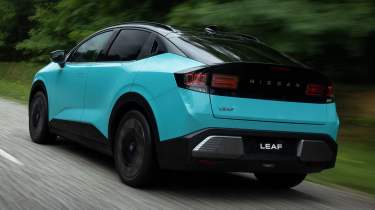
| Pros |
|
| Cons |
|
We’re finally starting to see some real progress with low-cost EVs in terms of range, and the new Nissan Leaf is no exception. Nissan offers two battery packs, both of which feel nicely rationalised to give customers different electric car propositions depending on their needs.
The first option is the base 52kWh setup that has a good range figure of around 270 miles on the WLTP cycle. Nissan says this model has been created to offer customers in more urban environments a good balance between range and cost, while also being more efficient thanks to its lighter battery pack.
The long-range variant has a slightly different mandate, with high motorway mileage being the key deliverable. As such, its battery pack is enlarged to 75kWh, giving this relatively small electric car a comparatively big range of up to 375 miles. Nissan has also gone to great lengths to extensively test the car’s high speed range, giving us a self-verified high-speed range of just nearly 270 miles at an average speed of 70mph.
| Model | Range | Peak DC charging | Insurance group |
| Nissan Leaf standard-range | 270 miles | 105kW | NA |
| Nissan Leaf long-range | 375 miles | 150kW | NA |
Electric range, battery life and charge time
As we’ve yet to drive the car over a sustained period on the public roads, we’ll have to take the word of Nissan and the official WLTP tests when it comes to range figures for both Leaf models, but early impressions are good. Being based on a pure-electric platform, rather than one adapted from an ICE car like previous Leaf generations, the car’s efficiency is comparable with all its key rivals and better than the previous generation Leaf, which was lighter.
Things like battery life are tricky to ascertain at this stage, but the usual battery life safeguards apply, like only charging to 100 per cent when required and making the most of the car’s on-board navigation system to precondition the battery before a fast charge. Nissan quotes a peak DC charging rate of 105kW for the 52kWh battery and 150kW for the 75kWh battery. These different speeds mean that both models are able to charge from around 20 to 80 per cent in under 30 minutes, which is around average for this class.
While the range figures are now much more impressive than for the previous Nissan Leaf models, the new car arrives at a time when rivals are also upping their game. Top spec versions of direct competitors, like the VW ID.3 or Kia EV3 are capable of similar ranges in the high 300-mile region but have more variety in terms of battery sizes.
To get an accurate valuation on a Nissan Leaf check out our free car valuation tool...
Interior, design & technology
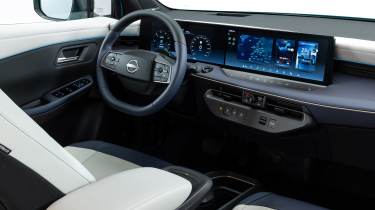
| Pros |
|
| Cons |
|
Nissan’s gone for a practical, efficient and tech-forward look for the new Leaf, leaving superfluous design elements largely off the table. While it probably won’t win the Red Dot award for car interiors, it is quick and easy to figure out, even with the large screens and relative lack of physical controls.
Crucially, the key elements are there, including a physical volume knob, physical buttons on the steering wheel and few climate and infotainment controls separated from the main displays. However, some of these are touch sensitive panels rather than buttons, which some might find irritating.
The driving position is higher than before, and ensures the top-edge of the display screens don’t sit higher than the base of the windscreen. This is good for outward visibility, especially up front.
So while the interior isn’t particularly plush or luxurious, the plastics do feel hardy and robust. They should stand up to daily use without any issue. The light-coloured seats of the top-spec model we tested feel comfortable and supportive, and together with the clever electrochromic glass roof, also make the cabin feel light, airy and modern.

Infotainment, sat-nav and stereo
All Nissan Leafs, aside from the entry-level Engage model, feature a pair of 14-inch screens, both fitted with a substantially refreshed user interface underpinned by Google software. This is excellent news for users, as the embedded navigation system is founded on the huge dataset available through the tech giant’s Google Maps product. Traffic, parking and places of interest information is all featured.
Charging locations are also included and, thanks to over-the-air updates, this info is constantly improved over time to keep the system up to date with new infrastructure. The navigation tech is capable of intelligent route planning, taking into account things like the ambient temperature, inclines and even the efficiency of different public charging networks in different countries to estimate journey times. This will be especially useful for European road trips.
The system is able to update the route planner actively depending on traffic conditions, and will even re-route you to a different charging station if all the points are taken at the next planned stop. The maps are also able to be viewed on the driver’s display, leaving the main screen free for other uses.
Functionality across the rest of the infotainment system is also great, with clear and simple menu structures, big icons and quick responses. The ‘home’ screen is configurable to show the information of your choice, and even comes with different themes, including one that adjusts to the time of day.
Apple CarPlay and Android Auto are standard alongside wireless charging, but we’re now at a point where the embedded system is more than good enough for owners not to need those phone-mirroring systems.
The air-conditioning is controlled either through a panel of touch sensitive controls or the display that shows the settings at all times in a fixed bar. Inputs like changing the temperature or fan speed are quick to make as a result.
Another nice touch are the forward and back keys in the centre console, which also features a mute and volume knob that’s quick and easy to find. It definitely feels like a car designed around feedback on how consumers actually use their cars, rather than one that pushes drivers to use it in a certain way. Other bits, like the easy shortcuts to select a personalised ADAS driver assistance setup with just a quick press of two buttons on the steering wheel, and the ability to control both screens directly from the wheel are further evidence of this.
Boot space & practicality
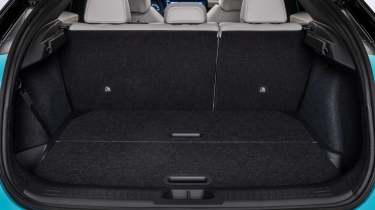
| Pros |
|
| Cons |
|
This third generation of Nissan Leaf might look like it sits in a brand new market sector thanks to its sleek profile and high stance, but it still effectively operates in the same C-segment as its predecessors. This puts it up against rivals like the VW ID.3, our 2025 Car of the Year, the Skoda Elroq and Kia’s EV3.
The difference to these alternatives is that rather than an upright, boxy silhouette, Nissan has gone for a sloping rear end for both aesthetic and practical reasons. The impact of this is arguably most obvious inside the cabin, or more specifically when you open the tailgate.
Dimensions and size
At just over 4.4m long, the Nissan Leaf is only just longer than rivals like the VW ID.3 and Kia EV3. In fact, the Leaf looks quite a bit bigger than it actually is in pictures – quite a rare thing for modern EVs which usually create the opposite effect.
This makes it ideal for town driving, however the sloping roofline does create a few compromises in terms of luggage space compared to boxier rivals.
| Dimensions comparison | |||
| Model | Nissan Leaf | Kia EV3 | Skoda Elroq |
| Length | 4,350mm | 4,300mm | 4,488mm |
| Width | 1,810mm (2,098mm inc mirrors) | 1,850mm | 1,884mm (2,148mm inc mirrors) |
| Height | 1,550mm | 1,560mm | 1,625mm |
| Wheelbase | 2,690mm | 2,680mm | 2,765mm |
| Boot space | 437 - 1,052 litres | 460 - 1,250 litres (plus 25 litre front boot) | 470 - 1,580 litres |
Boot space
The Nissan Leaf’s sloping roof is most evident in the boot. Although the space below the parcel shelf is a class-competitive 437 litres, the tailgate glass can get in the way if you need to fit bulkier items, like a chest of draws or something like that, inside.
Reliability & safety
| Pros |
|
| Cons |
|
Still being in its final prototype phase, we’re unable to say anything definitive about the new Leaf’s reliability, but we expect that its safety score will be towards the top of the class thanks to plenty of standard safety assistance technology.
It also includes a full ADAS suite, which can easily be personalised to the driver’s preferred settings. However, Nissan’s three-year 80,000-mile warranty is only average in 2025, although it does have a longer eight years of coverage for the battery and its electrical components.
Buying and owning
Best buy: Nissan Leaf 75kWh Engage+ trim
While it’s tough to give a definitive verdict on specific models at this stage, the 75kWh long-range model in the mid-level Advance trim certainly doesn’t seem to make many compromises in its quest for big range. We’re certain this model, with its key tech, but without expensive trinkets like the biggest wheels and the glass roof will find an ideal balance between value and kit.
Alternatives
Key rivals to the latest Nissan Leaf include the Volkswagen ID.3, Kia EV3, Hyundai Kona Electric, and award-winning Skoda Elroq. While it certainly compares well to them now, the EV world is a fast-moving place, so this isn’t likely to stay this way for too long.
Great leasing deals on the Nissan Leaf's rivals
Skoda Elroq
KIA EV3
Volkswagen Id.3
Nissan Leaf pictures
Frequently Asked Questions
The Nissan Leaf is a great car, and is competitive against all key rivals





